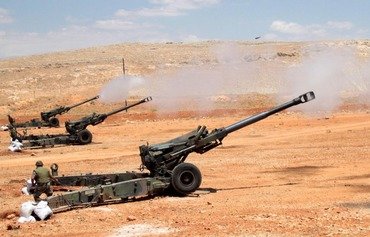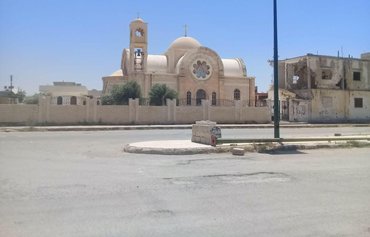Residents of Maharda in rural Hama province tell Al-Mashareq their town has become an assembly point for sectarian militias fighting in support of the Syrian regime, placing them in direct danger.
They are living in a constant state of fear, they said, as the arrival of Lebanon's Hizbullah, Iran-backed militias from Iraq and Iran's Islamic Revolutionary Guard Corps (IRGC) has turned them into human shields.
The heavy presence of pro-regime militias puts town residents at risk of coming under fire at any time, they said.
The current situation in the town is dire for civilians, said Maharda native Samer Antoun, who asked to use a pseudonym out of fear for his safety.
Things got worse about three months ago, he told Al-Mashareq, when "Hizbullah-affiliated armed groups began appearing in town and taking positions within or near the regime’s army positions".
Before that, he said, residents had occasionally spotted Hizbullah fighters on the outskirts of town, but no one was certain of their presence until recently, when they began appearing publicly, along with Iraqi and Iranian fighters.
"Their heavy presence and the fact that they are clearly protecting themselves with civilians has turned the residents into real human shields," he said, noting that these fighters have been hiding between civilian homes to avoid shelling.
Town elders and local clerics tried to persuade regime forces and their allies to stop putting civilians at risk, but to no avail, Antoun said.
"Their response is always that they act on the orders of the army’s command, and it is impossible to go against them," he said.
Influx of pro-regime militias
As pro-regime fighters arrive in the town, whose population has dropped to 20,000, the militias have been housing them in the abandoned homes of civilians who fled for safer areas, Antoun said.
The regime’s army has turned churches and monasteries into military positions, he added, including St. George's Monastery, which has been transformed into the largest regime base in rural Hama province.
"It was initially agreed that an army detachment would protect the monastery, with the approval of the friars and monks in charge of it," he said.
But this small hub of army soldiers eventually expanded into a military base and has become a main hub of operations in the area.
Maharda native Simon Hanna, who fled for Hama when the situation grew tense, told Al-Mashareq his hometown had been largely spared from military operations, save for a few instances of light shelling and sporadic sniping.
Most of this came from opposition groups, he said, and from the terrorist group al-Nusra Front (ANF), now known as Fatah al-Sham Front.
In recent months, however, ANF withdrew and the Free Syrian Army (FSA) moved in, many of whom have direct personal relations with town residents.
"Since then, the regime’s army has increased the number of its positions and posts in town and [facilitated] the entrance of non-Syrian elements from Iran, Iraq and Lebanon belonging to the IRGC and Hizbullah," he said.
Gradual takeover of town
It became clear that the buildup of pro-regime forces was intended to empty the town after regime and allied militias set up artillery positions between the houses and began shelling from inside the town, Hanna said.
This produced inevitable return fire, and made it unsafe for civilians, he said.
Maharda native Jamil Rajeh told Al-Mashareq the regime forces had initially allowed residents to form national defence groups to defend their town and guard its perimeter against extremist infiltration.
He said he personally participated in these groups out of his belief that the town’s residents must be protected from any potential action against them.
"All the military positions were manned jointly by members of the regular army and these [popular defence] groups, until the Hizbullah groups appeared in the region," he said.
When they arrived, the popular defence groups were asked to withdraw from the front lines and take positions at certain locations inside the town, which rendered them of little use or effectiveness, he said.
"This frustrated the members of these groups, and many of them cast their weapons aside and left town for good," Rajeh said.
The regime began to spread the word that this was done to protect them, as they lacked the necessary combat experience to fight the militants "who intended to enter the city, slaughter its population and destroy its churches", he said.
This was the stated rationale behind bringing in regime-allied militias, including Hizbullah, he said.
The regime’s army and its allies recently used the town as a launchpad to carry out a number of operations aimed at expanding their presence, Rajeh said.
They assembled the assault forces inside the town before launching their operations, using civilians for protection, he said.

![An Iraqi fighter from the IRGC-backed Harakat al-Nujaba stands in front of a church in the Hama province town of Maharda. [Photo from the Shams Maharda Facebook page]](/cnmi_am/images/2017/04/26/7724-Syria-Maharada-IRGC-600_384.jpg)






